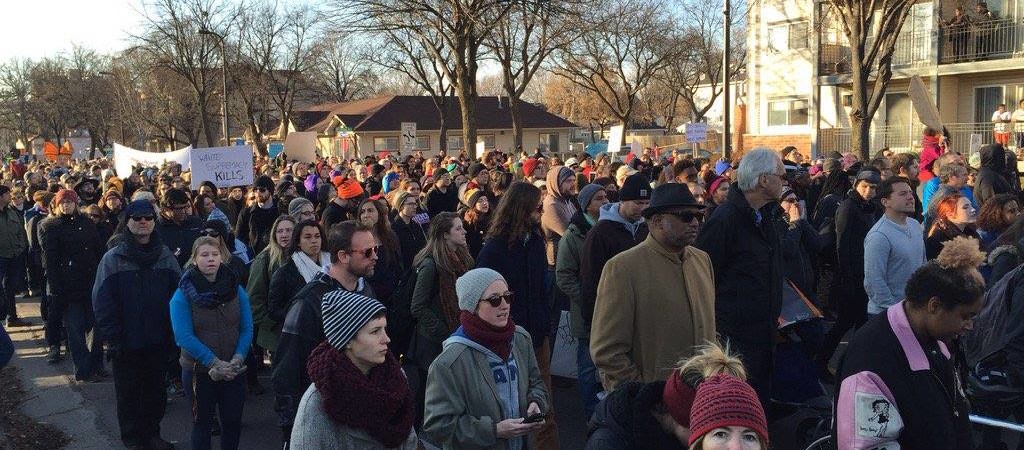A Black Lives Matter Sermon
November 24, 2015This sermon was delivered at the Michael Servetus Unitarian Society in Fridley, Minn. on Sunday morning, the 15th of November 2015, as Jamar Clark lay in hospital fighting for his life, shot by Minneapolis police. It was written in the wake of the deadly terrorist attacks in Paris, France; in Beirut, Lebanon; and Baghdad, Iraq. We share it with you the day after Lena spent most of the night at the camp at the 4th Precinct in Minneapolis dealing with the aftermath of a terrorist attack launched by white supremacists on the people participating in the occupation and calling for justice in the shooting death of Jamar Clark.
Read more →
Looking for Words that Help
April 21, 2013Here’s what I’ve been musing about all week, as events of all kinds have folded and unfolded: How do we describe forces that are indifferent to human life and suffering, and does our description make a difference as we try to lessen their hold on us?
Here’s when I started to wonder: When President Obama, initially describing the events just unfolding in Boston, said, “We don’t know if this is the act of terrorists or not.” And I thought, why don’t we know? Isn’t random killing of innocent civilians in a way designed to terrorize an entire city—isn’t that what terrorism means? And then I realized he meant that we didn’t know if it was the act of a specific group which is defined as a terrorist group.
But does that matter? The ‘lone gunman’ who so often is the perpetrator of these violent sprees terrorizes no less because he is not attached to a formal group. The families of the victims grieve no less. The by-standers are no less traumatized. I think that the definition matters only if we want to know exactly who to blame, and for license to retaliate.
The owners of the factory in West, Texas, who repeatedly assured the EPA that there was absolutely no danger of fire in their fertilizer plant: Weren’t they also acting from massive indifference to human life and suffering? Weren’t they putting their profit and convenience ahead of the lives of others? Are the people whose loved ones died or were injured there grieving any less? Are the by-standers any less traumatized?
Or this: The U.S. Senate, despite pleas from grieving parents of murdered children, and survivors of mass shootings, refused to take action to limit access to guns by even the tiniest bit. How are those 46 Senators who cast the no votes (and refused to let the majority rule) tied to the future suffering of the inevitable next mass shooting which we know will occur? Are they responsible?
I’m not going to use the word ‘terrorist’ to describe factory owners, or U.S. Senators, or even the two brothers who wreaked such harm in Boston last week. But I am going to wonder: How do we find language to hold one another accountable, to demand that businesses, governments, schools, churches, and individuals care for one another?
Because one thing I have observed in my life: Individuals mimic what we see. Indifferent parents lead to indifferent kids. Crummy teachers foster crummy students. Ineffective governments foster ineffective citizens. Democratic society can only happen with democratic government.
So I’m less interested in knowing who to blame and how to retaliate, and more interested in creating accountability between us all so that care for one another is maximized and violence between us is minimized. I’m interested in finding the language that will do that.
.
Renew Your Membership
We invite you to join your fellow CLFers to renew your CLF membership and stewardship of the CLF for another year.
Support the CLF
Can you give $5 or more to sustain the ministries of the Church of the Larger Fellowship?
If preferred, you can text amount to give to 84-321
Newsletter Signup
About
Quest for Meaning is a program of the Church of the Larger Fellowship (CLF).
As a Unitarian Universalist congregation with no geographical boundary, the CLF creates global spiritual community, rooted in profound love, which cultivates wonder, imagination, and the courage to act.
Contact
Church of the Larger Fellowship Unitarian Universalist (CLFUU)
24 Farnsworth Street
Boston MA 02210



